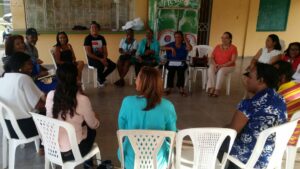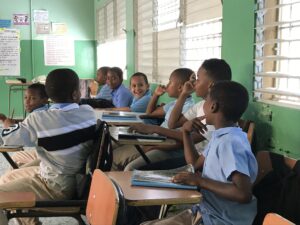Creating a Collaborative Platform for Monitoring, Evaluation, and Learning Interventions in the Dominican Republic
Implemented by Panagora from 2016 to 2021, the USAID/Dominican Republic Monitoring, Evaluation, and Learning Platform (DR MEL) helped USAID strengthen performance monitoring across its Dominican Republic portfolio, and conducted evaluations and assessments. USAID originally designed DR MEL with the belief that bundling country-level MEL services under a single implementing partner would be more efficient than managing them separately. While this certainly proved to be true, DR MEL became even more valuable as a model for high-impact collaboration between USAID and its MEL implementing partners.
Benefiting from a collaborative approach to monitoring, evaluation, and learning
DR MEL initially addressed two objectives in USAID’s Dominican Republic Country Development Cooperation Strategy: strengthening crime prevention and increasing people’s resilience to climate change. USAID/Dominican Republic pursued these objectives through 18 separate activities totaling a $93.5 million investment by the American people. In the third year of implementation, the Mission expanded DR MEL to include support for the health objective, aimed at controlling HIV and other health threats.

DR MEL’s evaluation of the USAID/Dominican Republic Criminal Justice System Strengthened Project included focus group discussion like this, where community leaders from low-income neighborhoods in Santiago de los Caballeros exchanged ideas about crime and violence, and how the police and judicial systems respond.
The DR MEL platform comprised a wide range of services, including data gathering; assessments, mid-term evaluations, and final evaluations; and performance monitoring, learning and adaptation, and capacity building. “Because we were an ever-present partner, USAID would begin collaborating with us in the earliest stages of designing all of these MEL interventions,” explains Chief of Party William Cartier. “This resulted in a much more robust and targeted approach than the Mission could have achieved by separately contracting each of its MEL assignments.”
Translating collaboration into trust
Beyond improving the quality of interventions, collaboration also had a cumulative effect on building the Mission’s trust in DR MEL. “Regular interaction meant we could have frank conversations about what was working and what wasn’t,” William Cartier says. “We soon saw that the Mission even accepted findings they didn’t agree with because they trusted the process and the messenger,” he added. This was particularly apparent in the justice sector, where DR MEL concluded that USAID/Dominican Republic had not adequately pursued its own plans for streamlining activities to avoid overlap and gain economies of scale.
Trust was an enabling factor for training as well. Panagora found that it was better able to meet USAID’s specifically-expressed needs through DR MEL because the Mission was active in determining capacity building curricula. In fact, USAID/Dominican Republic’ regularly rejected DR MEL’s ideas for training themes and proposed alternate ones that addressed pressing needs. This type of client-driven capacity building is especially vital in an Agency whose staff often reports that training needs to be less burdensome, better targeted, and timelier.
Translating trust into results
Among its efforts to strengthen performance monitoring at USAID/Dominican Republic, DR MEL notably developed a quarterly data registry to manage all indicators reported by the Agency’s local implementing partners. The registry allowed implementers and their Mission supervisors to access the same and up-to-date performance data to inform programming adaptations and significantly alleviated the amount of work that went into regular reporting.
The data registry also revealed recurring problems with data management that affected data quality such as imprecise definition of indicators, and lack of internal control in data collection and aggregation. In response, DR MEL developed a robust data quality assessment (DQA) tool, and worked with contracting officer’s representatives and agreement officer’s representatives to implement it. Faced with issues their own DQA processes hadn’t previously identified, Mission personnel and implementing partners appeared to show initial resistance to DR MEL’s DQA tool, but the activity’s close relationship with the Mission allowed it to get past this obstacle and address pressing problems with indicator data.

A group of students at a primary school class in La Vega waits as a team from DR MEL prepares to observe teaching methods for early grade reading as part of evaluating USAID/Dominican Republic’s Read program.
DR MEL likewise provided specialized services for 13 performance evaluations and assessments spanning USAID’s Dominican Republic program. These included whole-of-project evaluations and individual activity evaluations, focused assessments on gender and inclusive development, and sector-specific research to inform the design of new projects and activities for USAID/DR and Caribbean-wide programs.
Still, it is the sum of these parts that deserve the most attention. They clearly demonstrate the advantages of having a dedicated platform for USAID Missions to fulfill their MEL needs. While DR MEL did not have a separate collaboration, learning, and adapting (CLA) component USAID/Dominican Republic consistently used its recommendations to inform project and activity designs, and to adapt existing activities across all three development objectives. Since DR MEL’s completion in 2018, USAID as a whole has increasingly used this once-innovative approach in new contracts, and as a way to increase its interaction with implementing partners when they design learning and evaluation activities.